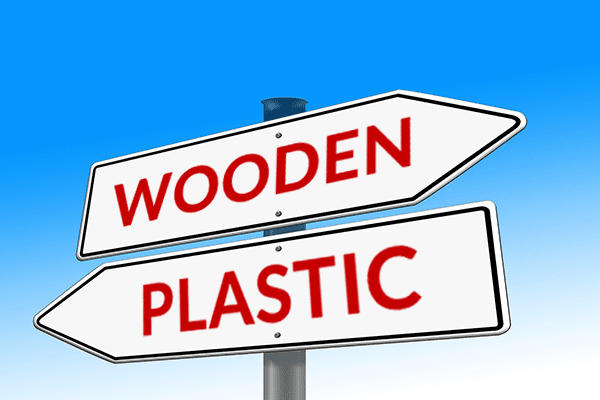Whilst wood still remains the most common material for traditional pallets to be made of, plastic pallets have become increasingly popular in recent years, to due to their hygienic qualities. But in the battle of the pallets, who wins, wood vs plastic pallets, read on to find out…

Traditionally, wood was used to make pallets as it was affordable to obtain, relatively lightweight and meant businesses could move cargo and heavier items more easily. Nowadays pallets are also available in plastic, which can be helpful depending on the use of the pallet. With a growing market for plastic pallets, we explore the pros and cons of both wood and plastic pallets:
Plastic pallets:
The pros
Easily cleaned – Unlike wood, which can be cleaned to a certain extent, plastic pallets are considered more hygienic as they can be cleaned more easily, making them very popular for food and pharmaceuticals companies due to their reusable and ‘wipe- clean’ qualities.
Lightweight – Plastic pallets are actually lighter than their wooden counterparts, and so can be handled more easily as well as being cost-efficient to ship when shipping is based on weight.
No heat treatment required – Wooden packaging must be heat-treated if they are going to be shipped to other countries. Currently heat treatment is required for pallets leaving the UK which will be delivered to Portugal and any other non-EU country worldwide. Plastic pallets don’t harbour the pests that heat treatment is required to prevent, so plastic pallets are exempt from requiring heat treatment.
The cons
Hard to repair – If a plastic pallet does get damaged it is more often thrown away as they are much harder to repair than wooden pallets. Plastic cannot just be nailed back together or glued, making the pallets hard to repair if they get damaged or break. They can also become brittle and chip easily, meaning that they are unsightly and are frequently discarded, assumed to be damaged. It may be the case small chips and cracks will have no performance impact, so these slightly damaged plastic pallets that look damaged may be discarded when they are still perfectly suitable, adding to plastic waste. Unfortunately only those with a trained eye will be able to detect an unsuitable, chipped plastic pallet from a suitable one.
Not eco-friendly – With more attention being focused to improving carbon footprints and making sure companies are considering their effect on the environment, plastic pallets are not the best option as plastic has a large carbon footprint when being made and is not easily disposed of. Plus with the recent movement to reduce plastic reliance in the UK, plastic pallets are quickly losing popularity.
Hard to recycle – Unlike wooden pallets that are often turned into many different things, plastic pallets cannot be recycled in this way. Once a plastic pallet is broken or can’t be used anymore, it is usually discarded. Meaning the company has to find a way to melt it down or recycle the plastic for use in another manner. This is another costly process for any company.
Expensive – New plastic pallets are up to 10 times more expensive than the wooden options when comparing like-for-like, making them a pricey option as well as bad for the environment.
Wooden pallets:
The pros
Repairable – Unlike their plastic equivalent, wooden pallets are easy to repair as they are a natural, pliable material and can be nailed or screwed back into place. Other parts of wooden pallets can be used to repair them, contributing to their repairable properties. Pallets tend to last a few years, but pallet parts can have decades of useful life in them, and so some pallets will have highly extended lives being refreshed continually by other spare parts; we affectionately refer to these as ‘Triggers Broom’ pallets…
Highly recyclable – Once they have been exhausted for their primary purpose of moving large and heavy items more easily, wooden pallets can then be recycled into a number of other things such as garden furniture and even for decorating wedding venues. Pallet parts from Universal Pallets are sent onward to become biofuel, animal bedding and a variety of other uses, nothing is wasted. So the scope for recycling wooden pallets proves they are far more favourable compared to plastic pallets.
Cheaper to buy – Wooden pallets are much cheaper to buy compared to the more modern plastic pallets, making them a better choice when buying in bulk or when a high number of pallets are needed. Plus when you’re done with them, companies like Universal Pallets may actually pay you for them, that’s right – we often buy them back and even pick them up for you!
Better for the environment – As a natural material, wooden pallets are much better for the environment from production through their life, and even towards the end of their life when they need to be recycled or repaired. Wood is easy to recycle, can be disposed of safely and in a manner that is much better for the environment compared to plastic.
The cons
Need repairing more frequently – The weather, external conditions and even spillages can have a damaging effect on wood as it is highly absorbent. When wood does absorb liquid, the wood can then warp and become soft, making it rotten and unsafe to use. However, wooden pallets are easy to repair so even if they are more susceptible to damage, they can be corrected.
Screws and splinters – Wooden pallets are slightly more hazardous to use as they can have exposed screws or nails and splinters on them. Unlike smoother plastic pallets, that can’t be repaired with additional nails. These minor hazards can easily be overcome by wearing gloves when handling wooden pallets and when you are using pallets for other uses such as decorative furniture, take extra care.
While we do sell plastic pallets, for us there is one clear winner – wooden pallets. The cost, eco-friendliness and versatility win out over plastic pallets and most of our customers still choose wood over plastic.
So whether you choose to invest in either plastic or wooden pallets, there is an option that will suit your business needs. Here at Universal Pallets we have both wooden and plastic options available, why not contact us today for more information or browse our online shop.
